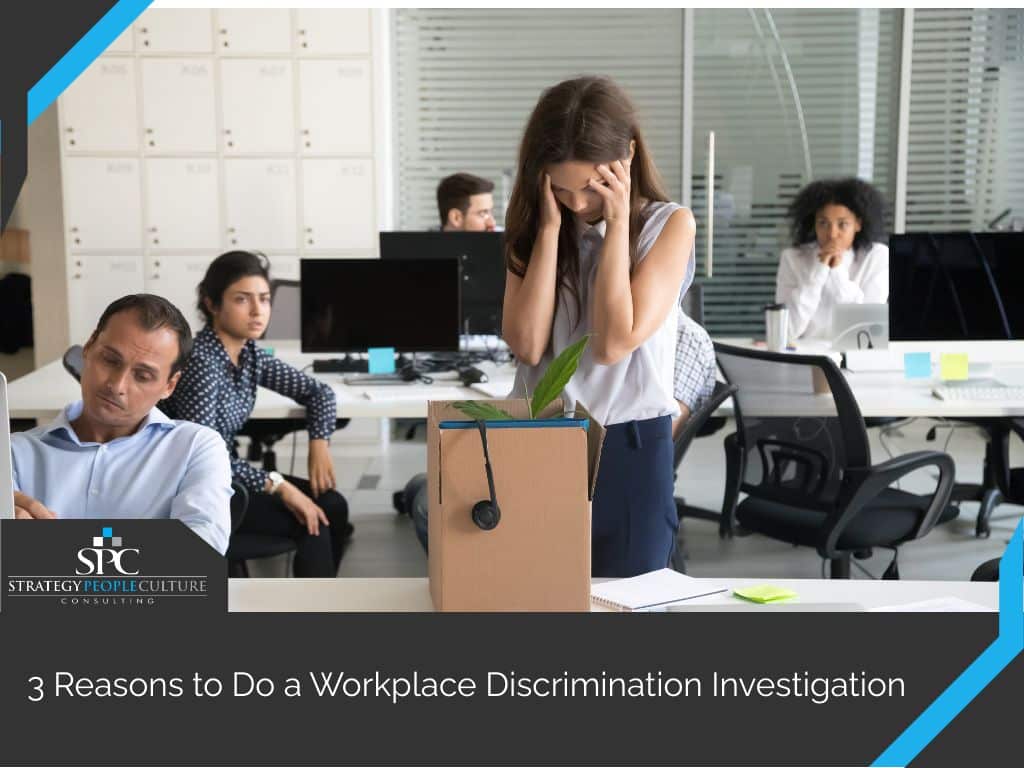3 Reasons to Do a Workplace Discrimination Investigation

Right now, we’re in an era that calls for personal – and corporate – responsibility with workplace discrimination. It’s the time of #MeToo, Black Lives Matter, Diversity Equity and Inclusion (DEI), and asking the world to do better regarding sexual harassment, racism, sexism, ageism, and other biases.
Between 2010 and 2017 alone, workers across the United States filed more than a staggering million employment discrimination complaints. In the past few years, this number has only increased as more employees have come forward trying to hold employers more accountable for what they view as an intolerable workplace.
What Exactly is Workplace Discrimination?
Discrimination can occur in many ways throughout your company – some more subtle than others. When someone is mistreated based on a protected class such as gender, race, sexual orientation, and many other characteristics (rather than individual knowledge, skills, and abilities), you’re dealing with discrimination.
More than ever, your employees, customers, and shareholders need to understand that your company takes discrimination seriously.
When it comes to workplace discrimination, no company is immune to the consequences.
Uber, the popular multi-billion-dollar rideshare app, was held to the fire over sexual assault allegations and sexual discrimination. Amazon has been called out for discriminatory hiring and promoting practices. Facebook was once accused of racial bias and the subject of a federal complaint.
The public has decided that all companies, no matter their size, can be held accountable for misconduct. So it’s time to conduct a workplace discrimination investigation – whether you think you need it or not.
An investigation allows you to demonstrate your dedication to handling discrimination and workplace harassment. Additionally, it teaches you what you really need to know about your company behind the scenes. Not investigating issues nor uncovering potentially inappropriate actions of discrimination and/or sexual harassment can lead to problems with recruitment, employee turnover, productivity, legal costs, and of course, your company’s reputation.
On the Strategy People Culture blog, we want to dive into some of the less obvious reasons for conducting investigations in the workplace. Understanding discrimination isn’t just your societal obligation – it’s legally required.
Let’s talk about three significant reasons for conducting workplace investigations and taking measures to remove discrimination – in all its forms.
1. It’s a Chance to Root Out Microaggressions
Discrimination isn’t always clear-cut. In fact, a large chunk of employment discrimination in the workplace occurs in the form of “microaggressions.”
According to researchers at Columbia University, microaggressions are defined as:
“Brief and commonplace daily verbal, behavioral, and environmental indignities, whether intentional or unintentional, that communicate hostile, derogatory, or negative slights and insults to marginalized individuals and groups.”
Although your company may be doing well at eradicating “macroaggression” or systematic biases, you may be missing some of the smaller, interpersonal instances of racism, sexism, or hatred. Conducting a serious investigation into the inner workings of your business will help you alienate instances of microaggression and prevent future incidents between employees.
You might be thinking, “But are microaggressions really as damaging or important to analyze as big instances of harassment or discrimination?”
The answer is yes – that is, if you want to be on the right side of the company dynamic.
Studies from the National Institute for Health (NIH) have revealed a significant relationship between perceived discrimination in the workplace (including microaggressions) and negative effects on mental and physical employee health.
It doesn’t matter if it’s a small comment made by a superior or an exclusionary remark at a company meeting. Microaggressions are often made subconsciously, but they’re still a form of employment discrimination in the workplace, and therefore, the company’s responsibility.
As of 2019, roughly 68 percent of Americans believe that microaggressions in the workplace are a problem. Roughly a quarter have experienced it personally, and another 36 percent claim to have witnessed it at some point in their place of employment.
Don’t wait for “micro” actions of discrimination to escalate. Instead, eradicate them at their core via a comprehensive workplace investigation. Learn how many of your own employees feel discriminated against, as well as what kinds of “microaggressions” are hindering your company culture and employee wellbeing.
2. Complaints and Actions Are Recorded
Our second big reason for conducting harassment investigations is for documentation purposes.
When it comes to growing and protecting your company, you want to have a record that shows you take discrimination claims and incidents seriously. Although not all types of employment discrimination are protected under United States federal law, discrimination based on any of the following classes is illegal:
- Discrimination in relation to age (especially employees over 40 years).
- Discrimination based on physical and/or mental abilities (Americans with Disabilities).
- Discrimination against women (pregnant or not) and/or employees with families.
From a purely logistical standpoint, a workplace discrimination investigation allows you to document your company’s dedication to preventing discrimination and discovering discrimination if it occurred. In addition, if there are instances of discrimination and/or harassment, the investigation should detail your awareness and response to the problems.
On average, settling a discrimination lawsuit outside of court will cost your business about $40,000. In more than half (67 percent) of the discrimination cases taken to court, the judge rules in the plaintiff’s favor.
In terms of risk management, you do not want your company under the scrutiny of the law for discrimination issues. However, if you are called to court, you want plenty of evidence supporting your efforts to discover the truth about what may or may not happen and prove you are committed to a workplace free of discrimination. There are hefty fines and powerful negative consequences for companies that brush off legal responsibilities to protect their employees.
Showcase your commitment to ending discrimination within your company with remedial actions for victims. Indicate that incidents like those potentially discovered in your investigation will not be taken lightly or repeated in the future.
Simply because you become aware of potentially discriminatory behavior does not mean someone in your company was discriminated against. Investigating such allegations will prove to the claimant and all your other employees who are likely paying attention, you take these matters seriously.
Moreover, if companies do not conduct investigations, they can potentially lose the opportunity to assert the Faragher-Ellerth defense. This is essentially an affirmative defense grounded in federal jurisprudence. If someone is mistreated, the company should not be held responsible because they took all reasonable steps to avoid and correct the issue.
At Strategy People Culture, we advise leadership at the top to heed the impact of harassment and discrimination on workplace culture. It’s the duty of all supervisors, managers, and leaders to document and respond to acts of discrimination. It’s also their responsibility to implement company policies that highlight corporate stances on harassment and discrimination.
At the end of the day, an investigation will make your workplace safer and help your business mitigate office harassment and discrimination liability. Show the world that you’re putting an end to harassment in the workplace with real documentation.
3. You Need Your Employees to Feel Safe

Team teamwork join hands partnership concept
Lastly, you want your employees to feel comfortable and protected in their place of work. A happy employee is a productive one, and safety is an enormous part of strong, positive workplace culture.
Unfortunately, roughly 75 percent of female harassment victims experience retaliation of some sort after reporting sexual harassment in the workplace. The victims of discrimination, male and female of any race, are often afraid to come forward to report harassment. They fear retaliation, either from their employer or from coworkers.
The Equal Employment Opportunity Commission (EEOC) report found less than a third of harassed employees make internal complaints. Fewer than 15 percent file formal legal charges. This does NOT mean employee workplace harassment isn’t occurring. Rather, it indicates workplaces are often not protected or encouraged enough to report discrimination and harassment safely.
That’s why you cannot wait for reports of discrimination to make it to leadership desks. As a CEO, manager, or supervisor, it’s your responsibility to understand if discrimination occurs on any level, reported or not.
This is especially true when it comes to sexual harassment investigations in the workplace. Unwelcomed conduct is far more common than we might think, but an analysis of your company might uncover some ugly truths.
Sexual harassment was cited as an issue for sex discrimination six times more than any other type of discrimination. At the same time, it’s heavily underreported throughout the United States, although more and more people are becoming vocal about hidden offenses.
If you want to know what’s really happening in your company, a workplace misconduct investigation is essential. Build trust with your employees by reassuring them they can – and should – report incidents of discrimination and/or harassment.
You want to be ahead of reported incidents rather than playing catchup when a problem is made public.
Make a public statement that discrimination is never tolerated and that those affected will be protected, not punished.
To Wrap It Up
If you’re a leader in your own business, it’s time to take a big step toward ending microaggressions, unfair treatment, harassment, and bias in the American workplace. After all, businesses cannot effectively run without people. Nothing else matters if employees are not giving their best. But, on the other hand, how can an employer expect someone to give their best if they do not feel protected, safe, and valued?
At least, that’s what we believe at Strategy People Culture.
Our mission is to foster better awareness in people and businesses via expert leadership development and executive coaching. We believe improving as a leader means connecting with your employees, and we’re here to help C-suite team members and others do that.
Do you have questions about conducting workplace discrimination investigations? Are you trying to become a better leader in your field? Don’t hesitate to send us a message or call (833) ROCK SPC.
We also offer anti-discrimination training for companies. You don’t have to hire outside experts such as us to conduct investigations; however, there are times you may need to. Schedule a free consultation today to learn more about effective discrimination investigations.






